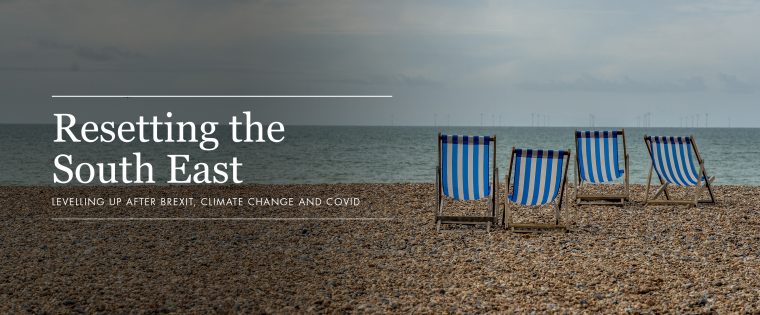Give South East freedom to grow its own way, Localis report urges

Government must rethink its assumption that merely directing investment away from an ‘overheated’ South East will cool intense living pressures affecting the region and benefit the rest of the country, the think-tank Localis has argued.
In a report published today entitled ‘Resetting the South East: levelling up after Brexit, Covid and climate change’, Localis makes the case that the inherent strengths of the region, which leads the country in export-led growth, demand a greater devolution of economic control, infrastructure investment and transport coordination.
According to Localis, a more nuanced devolution settlement for the South East would empower local councils to alleviate deprivation in parts of the region – especially coastal areas – which are as left-behind as anywhere else in the country, improve quality of life for residents and boost central government’s Net Zero and Global Britain ambitions.
Other report recommendations include suggestions to:
- Establish a South East Finance Commission – along the lines Boris Johnson did as London Mayor – to investigate how appropriate fiscal levers could help the region as a net contributor to public finances self-fund investment to boost the regional economy and improve people’s quality of life.
- Convene a ‘Summit of the South East’ with a view to presenting an agreed preferred structure for local governance and regional priorities to the government’s Levelling Up Director.
- Put Transport for the South East on a statutory footing with strategic responsibilities to improve and invest in transport connectivity and reduce carbon emissions.
Localis chief executive, Jonathan Werran, said: “Although the government has declared the levelling up agenda is not in the business of ‘decapitating tall poppies’, and paid lip service to the notion that devolution means doing thing differently in different places, there is a risk of throwing the baby out with the bathwater.
“While it is not too late for government to correct devolutionary course, it is also incumbent on the south east’s local leaders to present the incoming Levelling Up Director with a unified and coherent approach to making the south east a champion of global trade, clean growth and improved transport and quality of life for residents – many of whom live in areas of deprivation which belie the region’s reputation as a land of plenty.”
Localis researcher, Callin McLinden, said: “Levelling up discourse has been frustrating for the South East. Despite the region’s surface prosperity, the South East contains pockets of deprivation and inequality. The recently published White Paper provided some nuance, yet unfortunately still presented the South East as ‘overheated’ – with the region’s issues characterised as ones of demand, rather than structural inequality, productivity, or public service pressures.
“‘Resetting the South East’ is a more considered and expansive exploration of the South East’s role in levelling up, what levelling up can do for the South East, and what role the region’s local government should play in the agenda. It also seeks to make the case for a new approach to devolution, funding, and finance – one in which local government has genuine autonomy and is co-ordinated in the delivery of public value.”
Cllr Nicolas Heslop, chair of South East Councils, said: “South East England is the UK’s gateway to the world, positioned on the doorstep of the EU, with significant clusters of commerce and industry – long championing trade, the South East has been England’s highest exporting region.
“Crucially, the South East has been one of only two UK regions to be a net contributor to the Treasury. Ministers will want to ensure the South East has a secure economic foundation to meet challenges presented by pandemic impacts, the effects of climate change and a growing population which is set to reach 10 million people by 2030.”
Sean McKee, director, South East Councils, said: ““The South East enjoys strong economic relationships with other UK regions and our future growth is intertwined. Government plans for more devolution to English regions cannot simply by-pass the South East.
“The South East region can do more, can support more, can deliver more, for the UK with more control over its destiny.
“Councils need flexibility to ensure adequate infrastructure and public services provision to make the region attractive as a place to live, work and do business.
“A new model is needed to harness additional powers and new funding streams to empower local representatives to deliver for the communities they serve.”
A copy of the report can be downloaded here: ‘Resetting the South East: levelling up after Brexit, Covid and climate change’
